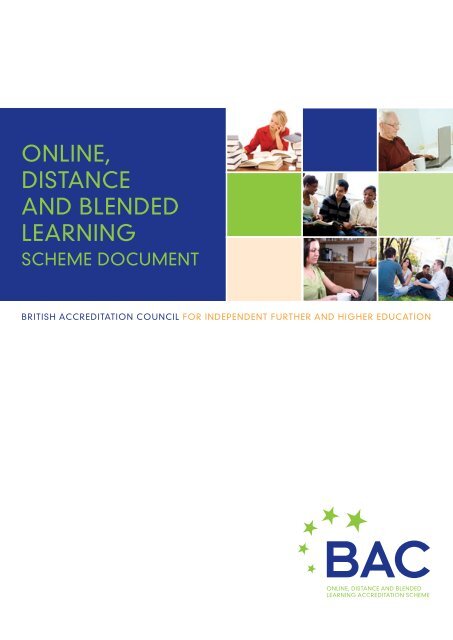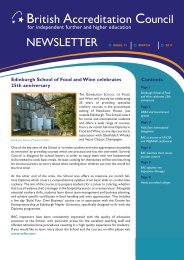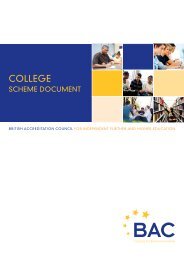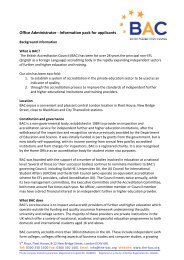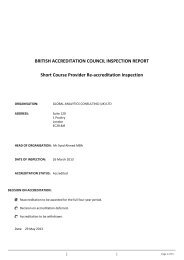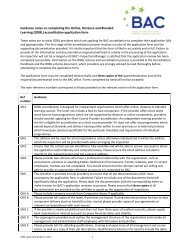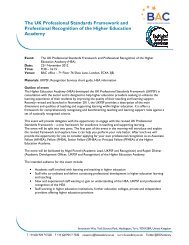Online, distance and blended learning accreditation scheme ... - BAC
Online, distance and blended learning accreditation scheme ... - BAC
Online, distance and blended learning accreditation scheme ... - BAC
You also want an ePaper? Increase the reach of your titles
YUMPU automatically turns print PDFs into web optimized ePapers that Google loves.
ONLINE,DISTANCEAND BLENDEDLEARNINGSCHEME DOCUMENTBRITISH ACCREDITATION COUNCIL FOR INDEPENDENT FURTHER AND HIGHER EDUCATION
CONTENTS1. INTRODUCTION ................................................................12. ELIGIBILITY FOR ACCREDITATION ....................................23. ACCREDITATION PROCESS ...............................................24. ACCREDITATION CYCLE ....................................................25. INSPECTION PROCESS ......................................................26. PROGRAMMES AND AWARDS .........................................37. EXTENSION OF COLLEGE ACCREDITATION ......................38. ACCREDITATION FEES .......................................................39. ACCREDITATION STATEMENTS AND MARKS ...................310. CONTACTING <strong>BAC</strong> .............................................................3APPENDIX A:MINIMUM STANDARDS FOR ONLINE, DISTANCEAND BLENDED LEARNING ACCREDITATION ...............................41. INTRODUCTIONThis document must be read in conjunction with the Accreditation H<strong>and</strong>book September 2012.<strong>BAC</strong> <strong>accreditation</strong> is a voluntary quality assurance<strong>scheme</strong> for independent providers of further <strong>and</strong>higher education <strong>and</strong> vocational training courses.The <strong>Online</strong>, Distance <strong>and</strong> Blended Learning<strong>accreditation</strong> <strong>scheme</strong> is designed to offer a tailormadequality assurance <strong>scheme</strong> which recognisesthe particular qualities <strong>and</strong> distinctive characterof providers which deliver teaching <strong>and</strong> <strong>learning</strong>through a variety of media.British Accreditation Council1
ONLINE, DISTANCE AND BLENDED LEARNING ACCREDITATION SCHEME DOCUMENT2. Eligibility for <strong>accreditation</strong>5. Inspection processAny independent education or training institution in the UK iseligible for <strong>accreditation</strong> as a provider of online, <strong>distance</strong> <strong>and</strong><strong>blended</strong> <strong>learning</strong> provided that the following requirementsare met:➜ The provider is established as a deliverer of online,<strong>distance</strong> or <strong>blended</strong> <strong>learning</strong> programmes.➜ The provider is able to provide evidence of itsfinancial stability.➜ The services provided must be managed <strong>and</strong> administeredfrom within the UK.➜ Effective control of the provider is the responsibility of anaccountable management based in the UK.➜ The provider is led by a proprietor or designated principal/director, who must be legally resident in the UK <strong>and</strong>have clear contractual responsibilities for the running ofthe provider <strong>and</strong> for the quality of its work.➜ There are no grounds for believing the proprietor,principal/director or any other senior manager to beunfit to have responsibility for the provider. Such groundsmay include an assessment of any previous position heldat another institution/provider known to <strong>BAC</strong>, in particularany institution/provider which consistently failed to meet<strong>BAC</strong>’s st<strong>and</strong>ards or which failed to repay debts owedto <strong>BAC</strong>.3. Accreditation processFor comprehensive information on the whole of the<strong>accreditation</strong> process please see the Accreditation H<strong>and</strong>bookSeptember 2012.4. Accreditation cycle<strong>Online</strong>, <strong>distance</strong> <strong>and</strong> <strong>blended</strong> <strong>learning</strong> <strong>accreditation</strong> is valid forfour years. Accredited providers are notified six months beforethe end of the <strong>accreditation</strong> period so that a full inspectioncan be arranged <strong>and</strong> the institutional report presented to theAccreditation Committee for consideration of re-<strong>accreditation</strong>before the <strong>accreditation</strong> period ends.A full inspection is arranged following successful completionof the first stage of the application process. The inspectionprocess for online, <strong>distance</strong> <strong>and</strong> <strong>blended</strong> <strong>learning</strong> providerstakes into account the special circumstances in which suchproviders work. The inspection falls into two distinct phases.The first is a computer-based assessment of the provider’swebsite, online materials both publicity <strong>and</strong> <strong>learning</strong> <strong>and</strong>a scrutiny of learners’ work. The second phase involves avisit to the main office of the provider where the inspectormeets with the management <strong>and</strong> administration to inspectdocumentation <strong>and</strong> to discuss the provider’s systems <strong>and</strong>policies. The duration of these visits will be determinedby the breadth <strong>and</strong> size of the provider’s services. If theprovider offers <strong>blended</strong> <strong>learning</strong> which involves a face-tofacecomponent, the inspector will visit the delivery venueon a separate occasion to inspect the premises <strong>and</strong> observethe teaching. With newly-accredited providers, an interiminspection is organised in the first year of <strong>accreditation</strong>. Foraccredited institutions, an interim inspection is organised inthe middle of the four-year <strong>accreditation</strong> cycle.Institutions are required to complete <strong>and</strong> submit a selfevaluationdocument assessing their quality assurancemechanisms against specific criteria prior to the inspectionbeing conducted.5.1 Inspection areasA full inspection covers the following inspection areas:➜ Management, Staffing <strong>and</strong> Administration➜ Teaching, Learning <strong>and</strong> Achievement➜ Learner Support➜ Management of Quality➜ Premises <strong>and</strong> Facilities (face-to-face components)5.2 Minimum st<strong>and</strong>ardsThe minimum st<strong>and</strong>ards for the online, <strong>distance</strong> <strong>and</strong> <strong>blended</strong><strong>learning</strong> <strong>accreditation</strong> are set out in Appendix A. Details areprovided of the documents which will need to be supplied <strong>and</strong>reviewed <strong>and</strong> of the staff members who the inspector/s willinterview during the inspection.2 <strong>Online</strong>, Distance <strong>and</strong> Blended Learning Accreditation
ONLINE, DISTANCE AND BLENDED LEARNING ACCREDITATION SCHEME DOCUMENTLegal <strong>and</strong> regulatory complianceAll new applicants <strong>and</strong> those applying for re<strong>accreditation</strong>are required to sign a declaration stating that the institutioncomplies with all relevant statutory requirements in force inthe country of operation, in connection with such matters ashealth <strong>and</strong> safety, safeguarding, employment law, copyright,disability provision, equal opportunities, planning consent,data protection <strong>and</strong> public liability. It is the institution’sresponsibility <strong>and</strong> the personal responsibility of the head ofthe institution to ensure that all requirements are met. <strong>BAC</strong>inspectors will not inspect the above areas but will note anyobserved breach of regulations. Although the compliancewith statutory requirements is not a <strong>BAC</strong> minimum st<strong>and</strong>ard,evidence of non-compliance will provide the AccreditationCommittee with grounds for refusal of <strong>accreditation</strong>.8. Accreditation feesAll providers awarded <strong>accreditation</strong> under this <strong>scheme</strong>will qualify for the online, <strong>distance</strong> <strong>and</strong> <strong>blended</strong> <strong>learning</strong>provider <strong>accreditation</strong> fee. Annual <strong>accreditation</strong> fees aredue in September of each year. Failure to pay the annual<strong>accreditation</strong> fee by the given deadline on the invoice will resultin suspension <strong>and</strong> the possible withdrawal of <strong>accreditation</strong>.9. Accreditation statements <strong>and</strong> marks6. Programmes <strong>and</strong> awards<strong>BAC</strong>’s policy is that providers should offer courses leading toapproved external awards granted by recognised awardingbodies. <strong>BAC</strong> does however accept that there may be instanceswhere there is no appropriate external awarding body <strong>and</strong>that the provider will only offer internal awards.<strong>BAC</strong>’s inspectors will consider the accuracy of any claims madeby institutions as to the level <strong>and</strong> status of any internal awards.This will include a requirement for evidence of the extent towhich the institution’s internal awards are accepted for thepurposes of employment or further study. <strong>BAC</strong> encouragesinstitutions to involve external moderators in the assessmentwhere appropriate.7. Extension of college <strong>accreditation</strong><strong>BAC</strong> accredited colleges which have decided to offer online,<strong>distance</strong> <strong>and</strong> <strong>blended</strong> <strong>learning</strong> programmes as an additionalservice may be eligible for a modified inspection process.Colleges are advised to contact <strong>BAC</strong> to discuss.Institutions which hold <strong>accreditation</strong> from other accreditingbodies <strong>and</strong> have decided to extend their provision intoonline, <strong>distance</strong> <strong>and</strong> <strong>blended</strong> <strong>learning</strong> are invited to contact<strong>BAC</strong> to discuss the options available.Providers which have been awarded online, <strong>distance</strong> <strong>and</strong><strong>blended</strong> <strong>learning</strong> <strong>accreditation</strong> may use the statement of<strong>accreditation</strong> in their promotional materials, subject to certainconditions.Acceptable forms of the statement are:➜ “accredited by the British Accreditation Council forIndependent Further <strong>and</strong> Higher Education as an <strong>Online</strong>,Distance <strong>and</strong> Blended Learning Provider”➜ “accredited by the British Accreditation Council as an<strong>Online</strong>, Distance <strong>and</strong> Blended Learning Provider”➜ “accredited by <strong>BAC</strong> as an <strong>Online</strong>, Distance <strong>and</strong> BlendedLearning Provider”➜ “<strong>BAC</strong> accredited as an <strong>Online</strong>, Distance <strong>and</strong> BlendedLearning Provider”Once accredited, providers may use the <strong>BAC</strong> <strong>accreditation</strong>mark of the ODBL <strong>accreditation</strong> <strong>scheme</strong> in their promotionalmaterials, subject to certain conditions. The st<strong>and</strong>ard<strong>accreditation</strong> mark features the <strong>BAC</strong> logo, colour-coded to thespecific <strong>accreditation</strong> <strong>scheme</strong>, <strong>and</strong> the word ‘accredited’.10. Contacting <strong>BAC</strong>Further guidance <strong>and</strong> details of the generic requirements <strong>and</strong>responsibilities for <strong>BAC</strong>-accredited institutions can be found inthe Accreditation H<strong>and</strong>book September 2012. Please contactinfo@the-bac.org for further information.It is <strong>BAC</strong>’s intention to minimise the burden placed oninstitutions which hold approved <strong>accreditation</strong> <strong>and</strong> to tailorinspection requirements to meet individual circumstances.However, only those providers which meet <strong>BAC</strong>’s statedcriteria for online, <strong>distance</strong> <strong>and</strong> <strong>blended</strong> <strong>learning</strong>, whatevertheir <strong>accreditation</strong> status, will be awarded online, <strong>distance</strong> <strong>and</strong><strong>blended</strong> <strong>learning</strong> <strong>accreditation</strong>.British Accreditation Council3
APPENDIX A: MINIMUM STANDARDS FORONLINE, DISTANCE AND BLENDED LEARNING ACCREDITATIONInspection area - management, staffing<strong>and</strong> administrationMinimum st<strong>and</strong>ards 1-41. The provider is effectively managed1.1 The management structure is clearly defined,documented <strong>and</strong> understood, including the role <strong>and</strong>extent of authority of any owners, trustees orgoverning body.1.2 Senior managers are suitably qualified <strong>and</strong>experienced, underst<strong>and</strong> their specific responsibilities<strong>and</strong> are effective in carrying them out.1.3 Senior managers have an underst<strong>and</strong>ing of the specialrequirements of online, <strong>distance</strong> <strong>and</strong> <strong>blended</strong> <strong>learning</strong>.1.4 There are clear channels of communication betweenthe management <strong>and</strong> staff, especially thoseworking remotely.2. The administration of online, <strong>distance</strong> <strong>and</strong><strong>blended</strong> <strong>learning</strong> is effective2.1 Administrators are suitably qualified <strong>and</strong> experienced<strong>and</strong> underst<strong>and</strong> their specific responsibilities<strong>and</strong> duties.2.2 The size of the administration team is sufficient toensure the effective day-to-day running ofthe provision.2.3 Offices are adequate in size <strong>and</strong> resources for theeffective administration of the provider.2.4 The administrative support available to themanagement <strong>and</strong> learners is clearly defined,documented <strong>and</strong> understood.2.5 Policies, procedures <strong>and</strong> systems are well documented<strong>and</strong> effectively disseminated.2.6 Data collection <strong>and</strong> collation systems are effectiveincluding the logging of tutor <strong>and</strong> learner submissions.2.7 Learner <strong>and</strong> tutor records are sufficient, accuratelymaintained <strong>and</strong> up-to-date.2.8 The provider has a robust security system <strong>and</strong> policiesin place for protecting the data of its learners<strong>and</strong> tutors.2.9 Satisfactory procedures are in place for theadministration of examinations <strong>and</strong> other meansof assessment.3. The institution employs appropriatemanagerial <strong>and</strong> administrative staff3.1 There are appropriate policies <strong>and</strong> effective proceduresfor the recruitment <strong>and</strong> continuing employment ofsuitably qualified <strong>and</strong> experienced administrative staff.3.2 Experience <strong>and</strong> qualifications claimed are verifiedbefore employment.3.3 There is an effective system for regularly reviewing theperformance of staff.4. Publicity material gives a comprehensive,up-to-date <strong>and</strong> accurate description of theonline, <strong>distance</strong> <strong>and</strong> <strong>blended</strong> <strong>learning</strong> offered4.1 The website <strong>and</strong> other publicity material give anaccurate description of the online, <strong>distance</strong> <strong>and</strong><strong>blended</strong> <strong>learning</strong> courses offered.4.2 All advertising materials <strong>and</strong> images provide anaccurate description of any training offered.Documents required(where appropriate)➜ Up-to-date organogram➜ Minutes of relevant committee or board meetings➜ Minutes of staff meetings➜ Detailed CVs for all managerial <strong>and</strong>administrative staff➜ Staff appraisal procedures <strong>and</strong>completed documentation➜ Staff H<strong>and</strong>book➜ Course descriptions➜ Correspondence with learners➜ Up-to-date, signed contracts of employment forsenior, academic <strong>and</strong> non-academic staff➜ Briefing materials for agents if used➜ Up-to-date prospectus <strong>and</strong> marketing material➜ Completed learner application forms <strong>and</strong> anylearner contracts➜ Stakeholder feedback forms➜ Completed feedback forms➜ Action plans for dealing with stakeholder feedback➜ Annual performance reviewsInterviews required(where appropriate)As part of their assessment, inspectors will holdinterviews with the following:➜ Principal/director➜ Senior administrator4 <strong>Online</strong>, Distance <strong>and</strong> Blended Learning Accreditation
APPENDIX A: MINIMUM STANDARDS FORONLINE, DISTANCE AND BLENDED LEARNING ACCREDITATIONInspection area - teaching, <strong>learning</strong><strong>and</strong> achievementMinimum st<strong>and</strong>ards 5-95. Management of the programme is effective5.1 There is a suitably qualified manager with experiencein online, <strong>distance</strong> <strong>and</strong> <strong>blended</strong> <strong>learning</strong> who hasresponsibility for teaching, <strong>learning</strong> <strong>and</strong> achievement<strong>and</strong> management of the tutor body.5.2 The provider has a sufficient number of qualified tutorsto give individualised instructional service toeach learner.5.3 The provider has a robust tutor recruitment systemwhich is designed to ensure the safety of the learners.The recruitment process for tutors working remotelyincludes a face-to-face (i.e. skype) interview.5.4 The allocation of tutors to courses provides for aconsistent <strong>learning</strong> experience <strong>and</strong> delivery ismonitored to ensure consistency.5.5 Realistic deadlines are set <strong>and</strong> communicated well inadvance to learners.5.6 Delivery methods are sufficient to attain the statedprogramme objectives <strong>and</strong> intended <strong>learning</strong> outcomes;suitable supplementary study aids have beenconsidered where appropriate, whether via investmentin technology, additional tutor support, issuing extrastudy materials or offering face-to-face <strong>learning</strong> sessions.5.7 The programme reflects current knowledge <strong>and</strong>practice. Internal programme reviews are conductedon a periodic basis.5.8 The programme is sufficiently comprehensive forlearners to achieve the stated programme objectives<strong>and</strong> its content is supported by sound research<strong>and</strong> practice.5.9 Commissioning of course materials is managedeffectively <strong>and</strong> materials are checked to ensurest<strong>and</strong>ardisation <strong>and</strong> consistency across the provision.5.10 Learner assessment is guided by published gradingpolicies <strong>and</strong> a marking system that includesprompt return of accurately, fairly, <strong>and</strong> consistentlygraded assessments.5.11 The provider uses assessment strategies whichdemonstrate the achievement of defined<strong>learning</strong> outcomes.5.12 The provider takes appropriate steps to identify<strong>and</strong> discourage cheating <strong>and</strong> plagiarism <strong>and</strong>penalise offenders.5.13 Learners have appropriate access to tutors for<strong>learning</strong> support.6. Tutors have an acceptable level of subjectknowledge <strong>and</strong> pedagogic skill6.1 Tutors are appropriately qualified <strong>and</strong> experienced.6.2 Tutors have an underst<strong>and</strong>ing of the special challenges<strong>and</strong> dem<strong>and</strong>s of online, <strong>distance</strong> <strong>and</strong> <strong>blended</strong> <strong>learning</strong>.6.3 Tutors have a level of subject knowledge, pedagogic<strong>and</strong> communicative skill which allows them to deliverthe content of programmes effectively.6.4 The appraisal procedures for tutors incorporate regularmonitoring of tutor feedback.6.5 Tutors are properly <strong>and</strong> continuously trained withrespect to provider policies, learner needs, instructionalapproaches <strong>and</strong> techniques, <strong>and</strong> the use of appropriateinstructional technology.7. Tutors respond to the individual <strong>learning</strong>needs of learners7.1 The academic backgrounds <strong>and</strong> particular needsof learners are taken into account in the delivery of theprogrammes which build on former <strong>learning</strong>or experience.7.2 Learners are encouraged <strong>and</strong> enabled to developindependent <strong>learning</strong> skills.7.3 Tutors respond to different <strong>learning</strong> needs of learnerswhere appropriate, taking various <strong>learning</strong> styles intoaccount in their planning <strong>and</strong> delivery of courses.7.4 Tutors employ effective strategies to check learners’underst<strong>and</strong>ing of concepts <strong>and</strong> programme content.7.5 Learners are made aware of the necessary level ofdigital literacy required to follow thestated programmes.8. Learners receive appropriate assessment<strong>and</strong> feedback on their performance <strong>and</strong>progress, which are effectively monitored8.1 Programmes are planned to include a schedule ofassessments, the procedures <strong>and</strong> criteria for which areavailable in writing <strong>and</strong> in advance to learners<strong>and</strong> tutors.8.2 Assessment outcomes are monitored to enable theidentification of learners who are not makingsatisfactory progress <strong>and</strong> prompt interventionwhere appropriate.8.3 Learners are made aware of how their progress relatesto their target level of achievement.8.4 Additional support or advice on alternativeprogrammes is provided to learners who are judged notto be making sufficient progress to succeed.8.5 Feedback is given to individual learners on a regularbasis, tailored to meet their specific needs <strong>and</strong>constructive in its nature <strong>and</strong> delivery.British Accreditation Council5
9. Assessments are designed to support <strong>and</strong>encourage the <strong>learning</strong> process, as well as tomonitor <strong>and</strong> establish the level of abilityacquired by the learner9.1 Assignments <strong>and</strong> assessments maintain an appropriatefocus on any assessment objectives or statement of<strong>learning</strong> outcomes established by the awarding body.9.2 Formative assessments appropriately reflect the nature<strong>and</strong> st<strong>and</strong>ards of summative examinations.Documents required(where appropriate)➜ Course plans (<strong>scheme</strong>s of work)➜ Samples of marked learners’ work➜ Sample placement tests➜ Records of learner progress➜ Samples <strong>and</strong> summaries of any learnerfeedback questionnaires➜ Documents relating to external moderation➜ CVs for all teaching staff➜ Evidence of tutor monitoringInterviews required(where appropriate)As part of their assessment, inspectors will holdinterviews with the following:➜ Principal/director➜ Programme managers➜ Senior administrator➜ Examinations officer➜ Tutors (telephone or online interviews)Inspection area - learner supportMinimum st<strong>and</strong>ards 10-1310. The enrolment process is comprehensive,transparent <strong>and</strong> supportive to applicants10.1 Applicants are provided with enough information toenable them to make a judgement on their suitabilityfor the course <strong>and</strong> the delivery methods <strong>and</strong> c<strong>and</strong>iscuss any concerns before enrolment.10.2 Enrolment <strong>and</strong> application documentation is easilyaccessible <strong>and</strong> simple to complete <strong>and</strong> submit.10.3 Learners are given advance information aboutcourse requirements <strong>and</strong> equipment for succeedingin the programme. The provider takes reasonable stepsto ensure that learners accepted for enrolment meetthese requirements <strong>and</strong> any claimed qualificationsare verified.10.4 Learners are enrolled on programmes under fair <strong>and</strong>transparent contractual terms <strong>and</strong> conditions. If onlylimited information can be made available, suitablyextended refund arrangements should be in place.10.5 The provider makes it clear to applicants that theyare responsible for checking that they have the skills<strong>and</strong> knowledge required to study on the chosen course.10.6 After enrolment, the applicant has the benefit of astated ‘cooling off’ period during which they can cancelthe enrolment.10.7 Learners are made aware of the English languageproficiency needed to study on <strong>and</strong> completethe programmes.11. Services provided meet the reasonable needsof learners11.1 Instructions <strong>and</strong> suggestions on how to study <strong>and</strong>how to use the tutorial materials are made available toassist learners to learn effectively <strong>and</strong> efficiently.11.2 Staff are available to assist learners to resolve issuesof a general <strong>and</strong>/or technological nature. All enquiriesfrom learners are h<strong>and</strong>led promptly<strong>and</strong> sympathetically.11.3 The provider ensures that learners underst<strong>and</strong> anysystem requirements, <strong>and</strong> have access to appropriatetechnical advice to assist with technological problemswhich are the provider’s responsibility.11.4 The provider supports <strong>and</strong> encourages peer-interactionthrough a variety of channels, e.g. forums <strong>and</strong> Twitter.11.5 Learners who are unable to make satisfactory progressthrough the programme are encouraged to continue<strong>and</strong> supported to achieve a satisfactory outcomewherever possible or offered an alternative programme.11.6 Learners have access to a fair complaints procedureof which they are informed in writing at the start ofthe programme.11.7 Learners are advised of <strong>BAC</strong>’s complaints procedure.6 <strong>Online</strong>, Distance <strong>and</strong> Blended Learning Accreditation
APPENDIX A: MINIMUM STANDARDS FORONLINE, DISTANCE AND BLENDED LEARNING ACCREDITATION12. Learner materials are appropriate to themedium of delivery <strong>and</strong> are effective12.1 Course materials are designed for a specific <strong>and</strong> clearlystated level of study <strong>and</strong> include appropriate supportwhen necessary.12.2 Course materials are appropriately presented <strong>and</strong>sufficiently comprehensive to enable learners toachieve the programme objectives.12.3 Course materials are accurate <strong>and</strong> reflect currentknowledge <strong>and</strong> practice <strong>and</strong> are regularly reviewed<strong>and</strong> revised.12.4 Programme designers make effective use of appropriateteaching aids <strong>and</strong> <strong>learning</strong> resources.12.5 The provider makes effective provisions for learners toaccess conventional <strong>and</strong> online resources.13. The technology used to deliver theprogrammes is fit for purpose <strong>and</strong> effective13.1 The provider uses appropriate <strong>and</strong> readily accessibletechnology to optimise interaction between theprovider <strong>and</strong> the learner <strong>and</strong> enhance instructional <strong>and</strong>educational services.13.2 The provider has access to the services of anexperienced IT technician who can ensure that systemsare operative at all times <strong>and</strong> provide support tolearners, tutors <strong>and</strong> staff working remotely.Documents required(where appropriate)➜ Learner induction material➜ Learner h<strong>and</strong>book or guidance documents➜ Home stay documentation➜ Samples of marked learner work➜ Records of learner progress➜ Samples <strong>and</strong> summaries of any learner feedbackquestionnairesInterviews required(where appropriate)As part of their assessment, inspectors will holdinterviews with the following:➜ Principal/director➜ Senior administrator➜ Tutors (telephone or online interviews)➜ Welfare officerInspection area - management of qualityMinimum st<strong>and</strong>ards 14-1814. The provider has effective systems tomonitor its own st<strong>and</strong>ards <strong>and</strong> assess itsown performance with a viewto continuing improvement14.1 There are effective systems for monitoring <strong>and</strong>periodically reviewing all aspects of theprovider’s performance.14.2 Reports are compiled at least annually which presentthe results of the provider’s reviews <strong>and</strong> incorporateaction plans.14.3 Reports include analysis of year-on-year results onlearner satisfaction, retention, achievement,examination results <strong>and</strong> completion rates.14.4 Action plans are implemented <strong>and</strong> regularly reviewed,with outcomes reported to the management.15. Learner progress is effectively monitored <strong>and</strong>the monitoring is linked to procedures toallow for prompt interventionwhere appropriate15.1 Prompt action is taken when learners missdeadlines, when set, or work submitted is not of asatisfactory st<strong>and</strong>ard.16. The provider has a means of accessing<strong>and</strong> monitoring the views of learners <strong>and</strong>other stakeholders <strong>and</strong> takes appropriateaction where necessary16.1 The provider has effective mechanisms for obtainingfeedback from learners <strong>and</strong> other stakeholders (suchas staff, partner providers <strong>and</strong> employers) on all aspectsof the provider’s provision.16.2 The feedback is regularly reviewed by management <strong>and</strong>action is taken where necessary.16.3 There is a mechanism for ensuring learners know whataction has been taken as a result of their feedback.16.4 Opinions of learners are systematically sought as onebasis for evaluating <strong>and</strong> improving tutorial materials,the delivery of instructions <strong>and</strong> educational services.17. There is a clear rationale for courses leadingto unaccredited or internal awards17.1 There is a clear statement of the level claimed relativeto the NQF where applicable <strong>and</strong> evidence that learnerswho receive the award meet the stated requirementsfor that level.17.2 There is evidence of the extent to which the awards areaccepted for the purposes of employment orfurther study.British Accreditation Council7
17.3 External moderators are involved in the assessmentprocess if appropriate to the level or programmebeing studied.18. There are satisfactory procedures for theadministration of examinations <strong>and</strong> othermeans of assessment18.1 Evidence is provided that the requirements of therelevant awarding bodies in terms of examinationsecurity <strong>and</strong> administration are complied with.18.2 For internal awards, there are effective systems inplace for examination security <strong>and</strong> administration, <strong>and</strong>clear procedures for learners to appeal againsttheir marks.18.3 The provider has processes through which the providerverifies that the learner who registers in theprogramme is the same learner who participates in<strong>and</strong> completes <strong>and</strong> receives the credit.Documents required(where appropriate)➜ Learner induction material➜ Learners’ h<strong>and</strong>book or guidance documents➜ Internal quality assurance documentation➜ Copies of any policies developed by the provider asa means of quality management➜ External quality assurance documentation➜ Learner files with details of registration, enrolment,attendance <strong>and</strong> qualifications➜ Documents relating to external moderation➜ Copies of annual reports to the awarding bodies forthe previous three years➜ Copies of any reviews carried out by or an behalf ofthe awarding bodies➜ Evidence of tutor monitoring➜ Staff appraisal procedures <strong>and</strong>completed documentation➜ Stakeholder feedback forms➜ Completed feedback forms➜ Action plans for dealing with stakeholder feedback➜ Internal annual performance reviewsInspection area - face-to-face component(if applicable)Minimum st<strong>and</strong>ards 19-2719. The provider has secure possession of <strong>and</strong>access to its premises19.1 The provider has secure tenure on its premises.19.2 Where required, the provider has access to suitableexternal premises for academic or non-academicpurposes of a temporary or occasional nature.20. The premises provide a safe, secure <strong>and</strong> cleanenvironment for learners <strong>and</strong> staff20.1 Access to the premises is appropriately restricted<strong>and</strong> secured.20.2 The premises are maintained in an adequate state ofrepair, decoration <strong>and</strong> cleanliness.20.3 There are specific safety rules in areas of particularhazard (e.g. science laboratories), made readilyavailable to learners, staff <strong>and</strong> visitors.20.4 General guidance on health <strong>and</strong> safety is madeavailable to learners, staff <strong>and</strong> visitors.20.5 There is adequate signage inside <strong>and</strong> outside ofthe premises <strong>and</strong> notice boards for the display ofgeneral information.20.6 There is adequate circulation space for the number oflearners <strong>and</strong> staff accommodated, <strong>and</strong> a suitable areain which to receive visitors.20.7 There are toilet facilities of an appropriate number <strong>and</strong>level of cleanliness.20.8 There is adequate heating <strong>and</strong> ventilation in all rooms.Interviews required(where appropriate)As part of their assessment, inspectors will holdinterviews with the following:➜ Principal/director➜ Senior administrator➜ Tutors (telephone or online interviews)➜ Learners (telephone or online interviews)8 <strong>Online</strong>, Distance <strong>and</strong> Blended Learning Accreditation
APPENDIX A: MINIMUM STANDARDS FORONLINE, DISTANCE AND BLENDED LEARNING ACCREDITATION21. Training rooms <strong>and</strong> other <strong>learning</strong> areas areappropriate for the programmes offered21.1 Training rooms <strong>and</strong> other <strong>learning</strong> areas provideadequate accommodation in size <strong>and</strong> number for theclasses allocated to them.21.2 Training rooms <strong>and</strong> any specialised <strong>learning</strong> areas (e.g.laboratories, workshops <strong>and</strong> studios) are equippedto a level which allows for the effective delivery ofeach programme.21.3 There are facilities suitable for conducting theassessments required on each programme.22. There is an appropriate policy on learnerattendance <strong>and</strong> effective procedures <strong>and</strong>systems to enforce it22.1 There is a clear <strong>and</strong> published policy on learnerattendance <strong>and</strong> punctuality, requiring that they attendat least 80% of their scheduled classes.22.2 Accurate <strong>and</strong> secure records of attendance <strong>and</strong>punctuality at each session are kept for all learners,collated centrally <strong>and</strong> reviewed at least weekly.22.3 Learner absences are followed up promptly <strong>and</strong>appropriate action taken.23. There are appropriate additional facilities forlearners <strong>and</strong> staff23.1 Learners have access to sufficient space <strong>and</strong> suitablefacilities for private study, including library <strong>and</strong>IT resources.23.2 Tutors have access to sufficient personal space forpreparing lessons, marking work <strong>and</strong> relaxation.23.3 There are individual offices or rooms in which academicstaff <strong>and</strong> senior management can hold private meetings<strong>and</strong> a room of sufficient size to hold staff meetings.23.4 Offices are adequate in size <strong>and</strong> resources for theeffective administration of the provider.24. Learners attending face-to-face componentsreceive appropriate support24.1 There is at least one named staff member responsiblefor learner welfare who is suitably trained, accessible toall learners <strong>and</strong> available to provide advice<strong>and</strong> counselling.24.2 Learners receive appropriate advice before arrival.24.3 Learners receive an appropriate induction <strong>and</strong> relevantinformation upon arrival.24.4 Learners are issued with a contact number for out-ofhours<strong>and</strong> emergency support.24.5 The provider has policies in place to avoiddiscrimination <strong>and</strong> a published procedure for dealingwith any abusive behaviour.25. International learners are provided withspecific advice <strong>and</strong> assistance (If applicable)25.1 International learners receive appropriate advice beforetheir arrival on travelling to <strong>and</strong> living in the UK.25.2 International learners receive an appropriate inductionupon arrival covering issues specific to the local area.25.3 Information <strong>and</strong> advice specific to internationallearners continues to be available throughout theprogramme of study.25.4 Provision of support takes into account cultural <strong>and</strong>religious considerations.26. Where residential accommodation isoffered, it is fit for purpose, well maintained<strong>and</strong> appropriately supervised (if applicable)26.1 Any residential accommodation is clean, safe <strong>and</strong> of ast<strong>and</strong>ard which is adequate to the needs of learners.26.2 Any residential accommodation is open to inspection bythe appropriate authorities, including Ofsted wherelearners under 18 are accommodated.26.3 A level of supervision is provided appropriate to theneeds of learners.26.4 Separate accommodation blocks are provided forlearners under 18.British Accreditation Council9
27. Where home-stay accommodation isorganised, the welfare of learners is ensured<strong>and</strong> the provider’s relationship with hosts isproperly managed (if applicable)27.1 Due care is taken in selecting home-stayaccommodation which both provides a safe <strong>and</strong>comfortable living environment for learners <strong>and</strong> isappropriately located for travel to the provider<strong>and</strong> back.27.2 Any home-stay accommodation is inspected beforelearners are placed <strong>and</strong> is subject to regular reinspectionby a responsible representative or agentof the provider.27.3 The provider has appropriate contracts in place withany hosts, clearly setting out the rules, terms <strong>and</strong>conditions of the provision.27.4 Appropriate advice <strong>and</strong> support is given to both hosts<strong>and</strong> learners before <strong>and</strong> during the placement.Documents required(where appropriate)➜ Current lease agreement(s)➜ Floor plan of each site being inspected➜ Booking documentation for delivery venues ortraining roomsInterviews required(where appropriate)As part of their assessment, inspectors will holdinterviews with the following:➜ Principal/director➜ Maintenance/facilities manager10 <strong>Online</strong>, Distance <strong>and</strong> Blended Learning Accreditation
© British Accreditation CouncilTelephone: 0300 330 1400 Fax: 0300 330 1401 Email: info@the-bac.org Website: www.the-bac.orgThe British Accreditation Council for Independent Further <strong>and</strong> Higher Education is registered as a charity (Charities Registration No. 326652) <strong>and</strong> is a private company limited by guarantee(registered in Engl<strong>and</strong> No. 1828990).This work is the copyright © 2012 of the British Accreditation Council for Independent Further <strong>and</strong> Higher Education. Permission granted to reproduce the entirety of this work or extractsfrom it for personal <strong>and</strong> educational use only. All extracts from this work must be acknowledged. All other rights reserved. This work is registered with the UK Copyright Service.


